Hello everyone as of today i am starting a joywrite project here is how it works.
You will first recieve and email,blogpost,comment on the internet saying something nice about you and this email.
Next you will copy this send it to 5 other people along with a friendly quote or message that you think this person deserves to brighten
If you do not want to participate please kindly send the email back to the person you recived it from.
The main point about this project is to spread joy around.
Please dont send any emails to strangers only people you are sure you know.
for people of my blog
I have already started the project and am sure it will get to you sometimes, so please wait.
thank you
sharky

Sunday, 9 June 2013
Sunday, 12 May 2013
Happy Mothers Day
HAPPY MOTHERS DAY EVERYONE!
take a moment to tell your mom you love her evem if you dont have a mom tell someone who is like a mom to you how much you enjoy them and how impotant they are
coment and tell me something nice you did . i made my a card and artwork and gave her breakfast in bread. she loved it so much!!!!!
her are a few mothers day quotes and poems
hope you enjoy!!!
_121..jpg)


take a moment to tell your mom you love her evem if you dont have a mom tell someone who is like a mom to you how much you enjoy them and how impotant they are
coment and tell me something nice you did . i made my a card and artwork and gave her breakfast in bread. she loved it so much!!!!!
her are a few mothers day quotes and poems
hope you enjoy!!!
_121..jpg)
Sunday, 28 April 2013
Superstar Rider
this is a 18 year old from my barn silver meadows
it is great
we have some amazing horses and riders including one who came in 3rd out of 26 WOW!
Here are some of her videos
her is her channel
taylorvmulligan
it is great
we have some amazing horses and riders including one who came in 3rd out of 26 WOW!
Here are some of her videos
taylorvmulligan
Tuesday, 23 April 2013
Earth Day Questions
I am going to ask a serise of Questions about are earth i wil answer them and i would love it if you would too. In the coments or just in your head. I just want to get you thinking
Q:
What is your favorite thing about nature?
A:
The animals, trees and plants and forgiving beatiful and inspiratinal they are.
Q:
What is your favorite thing to do while you are outside in nature?
A: read,write,draw,play and talk with friends . Really just enjoying it as much as i can.
Q:
What do you find most inspiratinal about nature ?
A:
How beatiful and inoccent it is and how different it all looks.
Q:
What do you do in your community to be eco friendly and kind to nature?
A:
i recycle,compost,garden,turn of lights,dont litter,use reusable containers and try to stay away from packeged food,i reuse,i try not to drive whenevere possible and i teel people (like so )
how amazing and kind nature is and how they can help save it.
Q:
Did you celebrate earth day by having an earth hour or doing something kind to the earth.
A:
Of course, i spent almoust the entire day outside had a earth hour and helped do some gardening and you should to. Save it well we have it.
Q:
What is your favorite thing about nature?
A:
The animals, trees and plants and forgiving beatiful and inspiratinal they are.
Q:
What is your favorite thing to do while you are outside in nature?
A: read,write,draw,play and talk with friends . Really just enjoying it as much as i can.
Q:
What do you find most inspiratinal about nature ?
A:
How beatiful and inoccent it is and how different it all looks.
Q:
What do you do in your community to be eco friendly and kind to nature?
A:
i recycle,compost,garden,turn of lights,dont litter,use reusable containers and try to stay away from packeged food,i reuse,i try not to drive whenevere possible and i teel people (like so )
how amazing and kind nature is and how they can help save it.
Q:
Did you celebrate earth day by having an earth hour or doing something kind to the earth.
A:
Of course, i spent almoust the entire day outside had a earth hour and helped do some gardening and you should to. Save it well we have it.
my earth day poems
Leaves
The sun curls around
nested in between there family
branches twisting by there side
wind rusuling trough
every while
some one falls
not to the ground
but to some place new
to leave on a journey
every leaf one at at time
every mountain and every brook
every forest and dessert too
spreading seeds for other trees
THANK YOU LEAVES!
Wind
Russel Russel
in my hair
birds are flying every where
Beat Beat
the sun on me
and the tree
next to me
Swish Swish
in the bush
thorny roses on my tosh
Blow Blow
says the wind
goodbye to my kin
Love Love
thank you nature
for you are my greatest neighbor
Russel
Beat
Swish
Blow
Love
The sun curls around
nested in between there family
branches twisting by there side
wind rusuling trough
every while
some one falls
not to the ground
but to some place new
to leave on a journey
every leaf one at at time
every mountain and every brook
every forest and dessert too
spreading seeds for other trees
THANK YOU LEAVES!
Wind
Russel Russel
in my hair
birds are flying every where
Beat Beat
the sun on me
and the tree
next to me
Swish Swish
in the bush
thorny roses on my tosh
Blow Blow
says the wind
goodbye to my kin
Love Love
thank you nature
for you are my greatest neighbor
Russel
Beat
Swish
Blow
Love
Thursday, 18 April 2013
Tuesday, 16 April 2013
Other blogs i share on
her are 2 blogs that i also am part of
A blog about saving the sharks that me and hippo#1 made click here
A blog made about a poetry club at our school with a bunch of my friends click here
Check them out they are sooo cool
-jowlgurl
A blog about saving the sharks that me and hippo#1 made click here
A blog made about a poetry club at our school with a bunch of my friends click here
Check them out they are sooo cool
-jowlgurl
Saturday, 13 April 2013
Friday, 12 April 2013
Tuesday, 9 April 2013
Monday, 8 April 2013
MASC
MASC is a conference for young authors and illustrators in Ottawa. This is my first year going and i am totally so exited. I love to write and always have
if anyone has any questions click here to check . We get to work with real authors and learn more about reading and writing . It is probably to late for you to sign up now but for next year i suggest, i will tell you how it all went on the 18th .
If anybody here on my blog is going to MASC or has been comment and tell me how it was
Jowlgurl
if anyone has any questions click here to check . We get to work with real authors and learn more about reading and writing . It is probably to late for you to sign up now but for next year i suggest, i will tell you how it all went on the 18th .
If anybody here on my blog is going to MASC or has been comment and tell me how it was
Jowlgurl
Sunday, 7 April 2013
MY FRIENDS AMAZING PERFORMANCE
hello
this is my amazingly talented bff performing an amazing cover of walk away renee at the school talent show
she is awesome and amazing
i woveed your performance
this is my amazingly talented bff performing an amazing cover of walk away renee at the school talent show
she is awesome and amazing
Wednesday, 3 April 2013
Tuesday, 2 April 2013
my lovley puppy
Monday, 1 April 2013
Stop Sharks Being Killed
hello i got this from Hippo#1's blog and i also agree with this i just thought she did such a great job explning it all so thanks FIN!
Stop Sharks Being Killed
Stop Sharks being killed.
Every year about 100 million Sharks are killed.
Shark fins for thousands of dollars soup
Shark teeth for jewelry
Shark Jaws for tourist souvenirs
Shark Skin for leather wallets/belts
Shark cartilage capsules and powders for phony medical cures
Shark liver oil for cosmetics/skincare products
Did you know that people go line fishing for shark fins, then they cut off their fins and just throw them back into the Ocean!
Since Sharks can not swim without fins, they drown.
Doesn't that make you angry!
I can understand how cavemen killed mammoths, because they used the whole thing, but when we only use the fins we are wasting lots.
The Sea Shepard is a great campaign that is against Shark Finning.
Basically they go around in their boat and when they find someone Shark Finning they do whatever it takes to stop them.
They made a Movie called Shark Water I highly recommend it, it made me cry and get so angry at the people who were Shark Finning, I said to myself why do they do that? Then I remembered that Shark Fins are Thousands of Dollars, so I think that they do it for the money.
Sunday, 31 March 2013
Saturday, 30 March 2013
Easter
hello everyone i am here wishing you a AWESOME EASTER ! (if you celebrate it )
i am not here tomorow so.
 THANK YOU
THANK YOU
p.s i hope you get lots of
i am not here tomorow so.
 THANK YOU
THANK YOUp.s i hope you get lots of

Thursday, 28 March 2013
Monday, 25 March 2013
AWESOME BLOGS TO CHECK OUT
my bffs blog
http://hippoawesome.blogspot.ca/
my great friends blogs
http://yippeeisme.blogspot.ca/
and
http://gabbypiper.blogspot.ca/
and
http://horsemolly.blogspot.ca/
and
http://smilesinhappytown.blogspot.ca/
And here are some of the my school blogs
my bffs class
http://churchill209.blogspot.ca/
or uke blog
http://chukuleles.blogspot.ca/
another class blogs
http://room312churchill.blogspot.ca/2013_01_01_archive.html
http://hippoawesome.blogspot.ca/
my great friends blogs
http://yippeeisme.blogspot.ca/
and
http://gabbypiper.blogspot.ca/
and
http://horsemolly.blogspot.ca/
and
http://smilesinhappytown.blogspot.ca/
And here are some of the my school blogs
my bffs class
http://churchill209.blogspot.ca/
or uke blog
http://chukuleles.blogspot.ca/
another class blogs
http://room312churchill.blogspot.ca/2013_01_01_archive.html
Sreet of Rock
hello
so this awesome person named gabby and her mother started this amazing activity called street of rock. At my school we used to have a club called school of rock were we would all get together and sing rock songs and then have a huge performance but sadly because of the strike it was cancelled so the amazing Gabby took it into her own hands to start up a street of rock with her mom and a friend of theres. IT IS SO MUCH FUN ! I try to make it every week. We have started learning 4 songs have about 15 kids and just recently had Kichisippi Times come to do an article on us THANKS DAVE, GABBY AND CAREN!
her are the songs we have been learning
Summer Vibe by Walk off the Earth
I love Rockin Roll by Jone Jett and the black hearts
Trouble by Taylor Swift
Stompa by Serena Ryder
so this awesome person named gabby and her mother started this amazing activity called street of rock. At my school we used to have a club called school of rock were we would all get together and sing rock songs and then have a huge performance but sadly because of the strike it was cancelled so the amazing Gabby took it into her own hands to start up a street of rock with her mom and a friend of theres. IT IS SO MUCH FUN ! I try to make it every week. We have started learning 4 songs have about 15 kids and just recently had Kichisippi Times come to do an article on us THANKS DAVE, GABBY AND CAREN!
her are the songs we have been learning
Summer Vibe by Walk off the Earth
Thursday, 21 March 2013
Black History Month
i KNOW this post is very late since last month was black history month but i still think that the entire should really be spent thinking about how lucky most people are to live in the time they are in and should not take it for granted. i mean can you imagine being sold being taken away from your mom and dad being grabbed chained pushed onto a boat and taken somewhere you don't know to do something you don't want to. I CANT ! if you want to learn more about this i am going to attach some good story books to do with black history month some websites\links and maybe the history and timeliness of all the laws passed and made.
NOTE : THEY DO SAY A WORD THAT WAS NOT BAD BACK THEN BUT IS NOW SO ASK YOUR PARENTS TO LOOK BEFORE READING

\
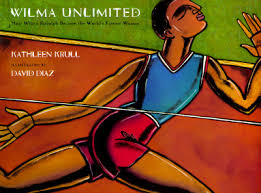
NOTE : THEY DO SAY A WORD THAT WAS NOT BAD BACK THEN BUT IS NOW SO ASK YOUR PARENTS TO LOOK BEFORE READING

\
| 1619 |
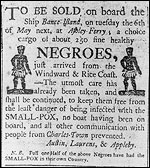
Photograph of newspaper advertisement from the 1780s
|
| 1746 |
Lucy Terry, an enslaved person in 1746, becomes the earliest
known black American poet when she writes about the last American Indian
attack on her village of Deerfield, Massachusetts. Her poem, Bar's Fight, is not published until 1855. |
| 1773 | 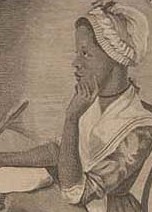
An illustration of Phillis Wheatley from her book
|
| 1787 |
Slavery is made illegal in the Northwest Territory. The U.S Constitution states that Congress may not ban the slave trade until 1808. |
| 1793 |
Eli Whitney's invention of the cotton gin greatly increases the demand for slave labor. |
| 1793 |
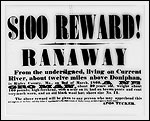
Poster advertising $100 reward for runaway slaves from 1860
Top |
| 1800 |
Gabriel Prosser, an enslaved African-American blacksmith, organizes a slave revolt intending to march on Richmond, Virginia.
The conspiracy is uncovered, and Prosser and a number of the rebels
are hanged. Virginia's slave laws are consequently tightened. |
| 1808 |
Congress bans the importation of slaves from Africa. |
| 1820 |
The Missouri Compromise bans slavery north of the southern boundary of Missouri. |
| 1822 |
Denmark Vesey,
an enslaved African-American carpenter who had purchased his freedom,
plans a slave revolt with the intent to lay siege on Charleston, South Carolina. The plot is discovered, and Vesey and 34 coconspirators are hanged. |
| 1831 |
Nat Turner,
an enslaved African-American preacher, leads the most significant slave
uprising in American history. He and his band of followers launch a
short, bloody, rebellion in Southampton County, Virginia.
The militia quells the rebellion, and Turner is eventually hanged. As a
consequence, Virginia institutes much stricter slave laws. William Lloyd Garrison begins publishing the Liberator, a weekly paper that advocates the complete abolition of slavery. He becomes one of the most famous figures in the abolitionist movement. Top |
| 1846 |
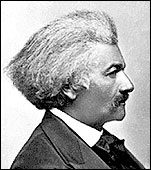
Frederick Douglass
Frederick Douglass launches his abolitionist newspaper. |
| 1849 |
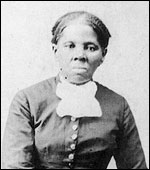
Harriet Tubman
|
| 1850 |
The continuing debate whether territory gained in the Mexican War should be open to slavery is decided in the Compromise of 1850: California is admitted as a free state, Utah and New Mexico territories are left to be decided by popular sovereignty, and the slave trade in Washington, DC, is prohibited. It also establishes a much stricter fugitive slave law than the original, passed in 1793. Top |
| 1852 |
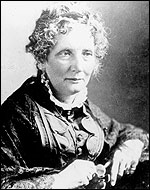
Harriet Beecher Stowe
|
| 1854 |
Congress passes the Kansas-Nebraska Act, establishing the territories of Kansas and Nebraska. The legislation repeals the Missouri Compromise of 1820 and renews tensions between anti- and proslavery factions. |
| 1857 |
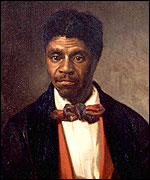
Oil painting of Dred Scott
|
| 1859 |
John Brown and 21 followers capture the federal arsenal at Harpers Ferry, Va. (now W. Va.), in an attempt to launch a slave revolt. |
| 1861 |
The Confederacy is founded when the deep South secedes, and the Civil War begins. |
| 1863 |
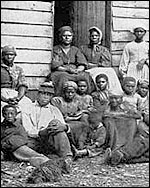
Slaves at Cumberland Landing, Va.
|
| 1865 |
Congress establishes the Freedmen's Bureau to protect the rights of newly emancipated blacks (March). The Civil War ends (April 9). Lincoln is assassinated (April 14). The Ku Klux Klan is formed in Tennessee by ex-Confederates (May). Slavery in the United States is effectively ended when 250,000 slaves in Texas finally receive the news that the Civil War had ended two months earlier (June 19). Thirteenth Amendment to the Constitution is ratified, prohibiting slavery (Dec. 6). Top |
| 1865-1866 |
Black codes are passed by Southern states, drastically restricting the rights of newly freed slaves. |
| 1867 |
A series of Reconstruction acts are passed, carving the former Confederacy into five military districts and guaranteeing the civil rights of freed slaves. |
| 1868 |
Fourteenth Amendment
to the Constitution is ratified, defining citizenship. Individuals born
or naturalized in the United States are American citizens, including
those born as slaves. This nullifies the Dred Scott Case (1857), which had ruled that blacks were not citizens. |
| 1869 |
Howard University's law school becomes the country's first black law school. |
| 1870 |
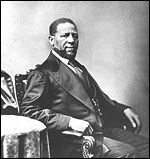
Hiram Revels
Hiram Revels of Mississippi is elected the country's first African-American senator. During Reconstruction, sixteen blacks served in Congress and about 600 served in states legislatures. |
| 1877 |
Reconstruction ends in the South. Federal attempts to provide some basic civil rights for African Americans quickly erode. |
| 1879 |
The Black Exodus takes place, in which tens of thousands of African Americans migrated from southern states to Kansas. |
| 1881 |
Spelman College, the first college for black women in the U.S., is founded by Sophia B. Packard and Harriet E. Giles. Booker T. Washington founds the Tuskegee Normal and Industrial Institute in Alabama. The school becomes one of the leading schools of higher learning for African Americans, and stresses the practical application of knowledge. In 1896, George Washington Carver begins teaching there as director of the department of agricultural research, gaining an international reputation for his agricultural advances. |
| 1882 |
The American Colonization Society, founded by Presbyterian minister Robert Finley, establishes the colony of Monrovia (which would eventually become the country of Liberia)
in western Africa. The society contends that the immigration of blacks
to Africa is an answer to the problem of slavery as well as to what it
feels is the incompatibility of the races. Over the course of the next
forty years, about 12,000 slaves are voluntarily relocated. |
| 1896 |
Plessy v. Ferguson: This landmark Supreme Court decision holds that racial segregation is constitutional, paving the way for the repressive Jim Crow laws in the South. Top |
| 1905 |
W.E.B. DuBois founds the Niagara movement, a forerunner to the NAACP. The movement is formed in part as a protest to Booker T. Washington's
policy of accommodation to white society; the Niagara movement embraces
a more radical approach, calling for immediate equality in all areas of
American life. Top |
| 1909 |
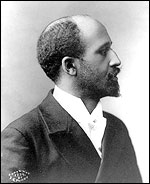
W.E.B. Du Bois
|
| 1914 |
Marcus Garvey
establishes the Universal Negro Improvement Association, an
influential black nationalist organization "to promote the spirit of
race pride" and create a sense of worldwide unity among blacks. |
| 1920s |
The Harlem Renaissance
flourishes in the 1920s and 1930s. This literary, artistic, and
intellectual movement fosters a new black cultural identity. |
| 1931 |
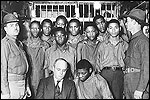
Scottsboro Boys
|
| 1947 |
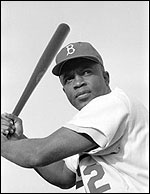
Jackie Robinson
|
| 1948 |
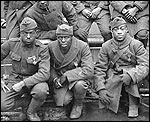
WWI Black Soldiers
|
| 1952 |
Malcolm X
becomes a minister of the Nation of Islam. Over the next several years
his influence increases until he is one of the two most powerful
members of the Black Muslims (the other was its leader, Elijah Muhammad).
A black nationalist and separatist movement, the Nation of Islam
contends that only blacks can resolve the problems of blacks. |
| 1954 |
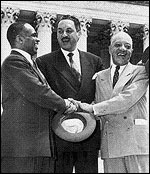
Pictured from left to right: George E.C. Hayes, Thurgood Marshall, and James Nabrit
|
| 1955 |
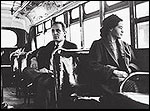
Rosa Parks
Rosa Parks refuses to give up her seat at the front of the "colored section" of a bus to a white passenger (Dec.1). In response to her arrest Montgomery's black community launch a successful year-long bus boycott. Montgomery's buses are desegregated on Dec. 21, 1956. Top |
| 1957 |
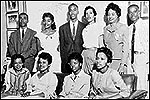
The Little Rock Nine
Nine black students are blocked from entering the school on the orders of Governor Orval Faubus. (Sept. 24). Federal troops and the National Guard are called to intervene on behalf of the students, who become known as the "Little Rock Nine." Despite a year of violent threats, several of the "Little Rock Nine" manage to graduate from Central High. |
| 1960 |
Four black students
in Greensboro, North Carolina, begin a sit-in at a segregated
Woolworth's lunch counter (Feb. 1). Six months later the "Greensboro
Four" are served lunch at the same Woolworth's counter. The event
triggers many similar nonviolent protests throughout the South. The Student Nonviolent Coordinating Committee (SNCC) is founded, providing young blacks with a place in the civil rights movement (April). |
| 1961 |
Over the spring and summer, student volunteers begin taking bus
trips through the South to test out new laws that prohibit segregation
in interstate travel facilities, which includes bus and railway
stations. Several of the groups of "freedom riders," as they are called, are attacked by angry mobs along the way. The program, sponsored by The Congress of Racial Equality (CORE) and the Student Nonviolent Coordinating Committee (SNCC), involves more than 1,000 volunteers, black and white.
Top |
| 1962 |
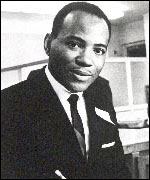
James Meredith
|
| 1963 |
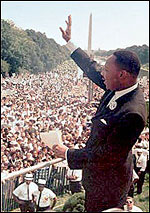
Martin Luther King, Jr.
The March on Washington for Jobs and Freedom is attended by about 250,000 people, the largest demonstration ever seen in the nation's capital. Martin Luther King delivers his famous "I Have a Dream" speech. The march builds momentum for civil rights legislation (Aug. 28). Despite Governor George Wallace physically blocking their way, Vivian Malone and James Hood register for classes at the University of Alabama. Four young black girls attending Sunday school are killed when a bomb explodes at the Sixteenth Street Baptist Church, a popular location for civil rights meetings. Riots erupt in Birmingham, leading to the deaths of two more black youths (Sept. 15). |
| 1964 |
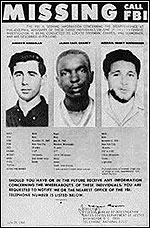
FBI photographs of Andrew Goodman, James Earl Chaney, and Michael Schwerner
The bodies of three civil-rights workers are found. Murdered by the KKK, James E. Chaney, Andrew Goodman, and Michael Schwerner had been working to register black voters in Mississippi (Aug.). Martin Luther King receives the Nobel Peace Prize. (Oct.) |
| 1965 |
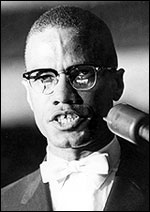
Malcolm X
State troopers violently attack peaceful demonstrators led by Rev. Martin Luther King, Jr., as they try to cross the Pettus Bridge in Selma, Ala. Fifty marchers are hospitalized on "Bloody Sunday," after police use tear gas, whips, and clubs against them. The march is considered the catalyst for pushing through the voting rights act five months later (March 7). Congress passes the Voting Rights Act of 1965, making it easier for Southern blacks to register to vote. Literacy tests, poll taxes, and other such requirements that were used to restrict black voting are made illegal (Aug. 10). In six days of rioting in Watts, a black section of Los Angeles, 35 people are killed and 883 injured (Aug. 11-16). Top |
| 1966 |
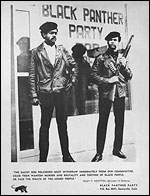
Members of The Black Panthers Party: Bobby Seale and Huey Newton
|
| 1967 |
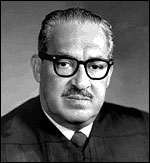
Supreme Court Justice Thurgood Marshall
Major race riots take place in Newark (July 12-16) and Detroit (July 23-30). President Johnson appoints Thurgood Marshall to the Supreme Court. He becomes the first black Supreme Court Justice. The Supreme Court rules in Loving v. Virginia that prohibiting interracial marriage is unconstitutional. Sixteen states still have anti-miscegenation laws and are forced to revise them. |
| 1968 |
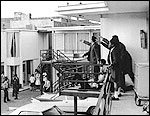
Eyewitnesses to the assassination of Martin Luther King, Jr.
President Johnson signs the Civil Rights Act of 1968, prohibiting discrimination in the sale, rental, and financing of housing (April 11). |
| 1972 |
The infamous Tuskegee Syphilis experiment
ends. Begun in 1932, the U.S. Public Health Service's 40-year
experiment on 399 black men in the late stages of syphilis has been
described as an experiment that "used human beings as laboratory animals
in a long and inefficient study of how long it takes syphilis to kill
someone." |
| 1978 |
The Supreme Court case, Regents of the University of California v. Bakke
upheld the constitutionality of affirmative action, but imposed
limitations on it to ensure that providing greater opportunities for
minorities did not come at the expense of the rights of the majority
(June 28). |
| 1992 |
The first race riots in decades erupt in south-central Los
Angeles after a jury acquits four white police officers for the
videotaped beating of African-American Rodney King (April 29). Top |
| 2003 |
In Grutter v. Bollinger, the most important affirmative action decision since the 1978 Bakke
case, the Supreme Court (5–4) upholds the University of Michigan Law
School's policy, ruling that race can be one of many factors considered
by colleges when selecting their students because it furthers "a
compelling interest in obtaining the educational benefits that flow from
a diverse student body." (June 23) |
| 2006 | In Parents v. Seattle and Meredith v. Jefferson, affirmative action suffers a setback when a bitterly divided court rules, 5 to 4, that programs in Seattle and Louisville, Ky., which tried to maintain diversity in schools by considering race when assigning students to schools, are unconstitutional. |
| 2008 |
Sen. Barack Obama, Democrat from Chicago, becomes the first African American to be nominated as a major party nominee for president. On November 4, Barack Obama, becomes the first African American to be elected president of the United States, defeating Republican candidate, Sen. John McCain. |
| 2009 |
Barack Obama Democrat from Chicago, becomes the first African-American president and the country's 44th president. On February 2, the U.S. Senate confirms, with a vote of 75 to 21, Eric H. Holder, Jr., as Attorney General of the United States. Holder is the first African American to serve as Attorney General. On February 9, the first African American female flight crew took their historic flight, having come together accidentally when the scheduled first officer called in sick. Captain Rachelle Jones, first officer Stephanie Grant, and flight attendants Diana Galloway and Robin Rogers flew together on an Atlantic Southeast Airlines flight from Atlanta to Nashville. |
Subscribe to:
Comments (Atom)









